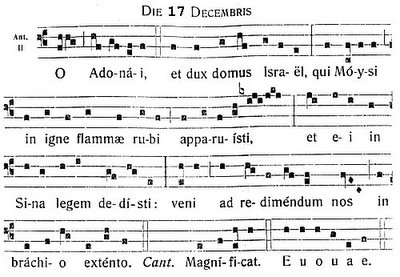We're in the Octave of Christmas right now, so here's that page.
Here's the Antiphon for Second Vespers, Gaudeamus, omnes fideles: Salvator noster natus est in mun do hodie processit proles magnifici ger minis, et perseverat pudor virginitatis. (loosely, "Let all faithful people rejoice: Our Savior is born something something...."):

They arrange it according to Sanctoral Cycle as well. Truly an amazing site.
Here's the page for Christmas Day; it goes on and on. I did go to Christmas Vespers this year, and was surprised to find that the Antiphon upon Magnificat was Hodie, Christus natus est, the very same tune used by Benjamin Britten in "Ceremony of Carols." That makes about the 300th time I didn't realize a well-known song was originally part of the chant....








